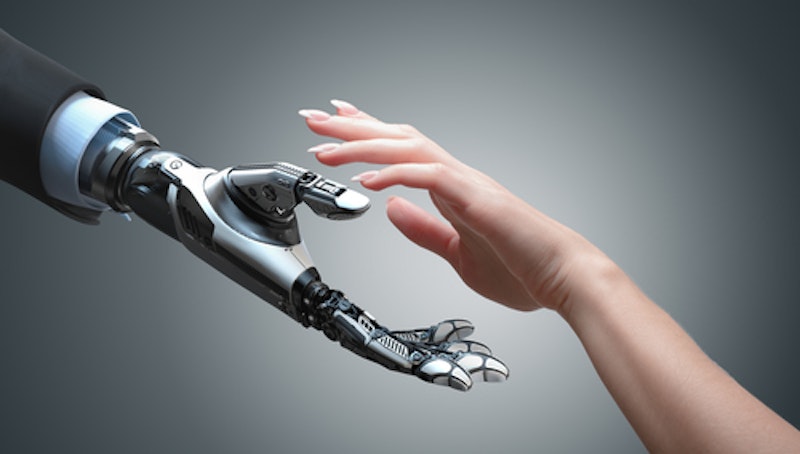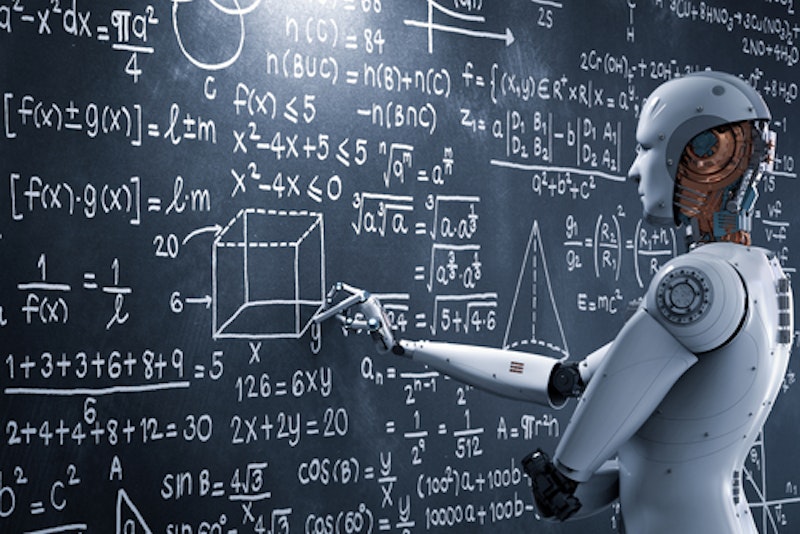Practice Exam Questions
How Automation Affects Employment
- Level:
- A-Level, IB
- Board:
- AQA, Edexcel, OCR, IB, Eduqas, WJEC
Last updated 4 Jun 2018
Here is an excellent essay written by a Year 12 student on the title "Examine the possible impact of robotics and artificial intelligence on both the pattern of employment and rate of unemployment in countries such as the UK."

One hundred and fifty years ago, and it would have been unfathomable to assume technology could have assimilated into every corner of our lives as it has now done. It has transformed productivity, help raise the material living standards of even the impoverished, and created employment in sectors that were unheard of not so long ago. In the late 18th century it was all about steam, water and mechanical production equipment; 100 year later and electricity and mass production revolutionised society. The latter stages of the 20th century also brought along electronics and IT, and now, the forth wave of automation is upon us – at the heart of which is robotics and artificial intelligence. Robotics deals with the design and construction of robots able to complete tasks previously accomplished by humans, and artificial intelligence is slightly more niche: performing tasks normally requiring human intelligence, visual interpretation and decision-making. The expected effect on both the pattern of employment, i.e. the structure of jobs in a society such as the UK, and on the level of employment, the bare number of jobs around, is also far more nuanced than one might expect.
The first impact of robotics and artificial intelligence concerns the most capital intensive jobs in our society – take the example of delivery drivers. As part of the sector of transport and logistics, these are in fact at the greatest risk of be substituted by ‘computer capital’, largely due to the routine nature of the task – coincidently far more crucial than if it be manual or white-collar. The takeaway food company Just Eat, for example, recently partnered with Starship Technologies, that make slow-moving pavement droids, using a six-wheel automated trolley capable of 10 minutes running at 4mph. Amazon too is looking into its own drone delivery service, and it signifies the start of one of the most worrying trends of the automation wave, known as the ‘hollowing-out effect’. Routine cognitive jobs requiring precision, that are not performed by the lowest-skilled members of the workforce, and are increasingly succumbing to automation. Because machines can now store colossal quantities of data, occupations including delivery drivers, but also cashiers, telemarketers and accountants are at risk – potentially leading to increased inequality. More on that later, though.
Not all jobs for society are being eradicated, and many are developing as a result, none more so than those at the heart of the revolution like software engineering. For every latest advancement, jobs are inevitably required for programming and constructions of algorithms to allow computers to make complex parameters and design choices within software. The rise of agile software development methodologies has also shone the spotlight onto automation testing and other ‘DevOps’ practices. As the market continues to open up, there will be more available jobs for entrepreneurs as well and if successful, their innovations will improve the standard of living and create more jobs. A classic case in point of combining high productivity with plenty of innovation is Germany, who of all the OECD countries in 2014, had the fewest average working hours per person per week, at just 27 hours, yet its economy is one of the strongest.

As well as the category of jobs being created from this wave of automation, some long-standing ones are also expanding. Combining increased productivity with higher levels of employment is particularly prevalent in knowledge-intensive sectors, where the easy access to information and accelerating pace of communication has improved many specialist services, in areas such as medicine, education and professional services. The number of accountants in England and Wales, for example, has risen twenty-fold since the census in 1871 to around 215,000 now – note the population has less than tripled in the same period, indicating the immense increase in jobs. With growing bureaucracy in medicine and health care in general causing great worker dissatisfaction and high worker turnover, robotics could do worse than just perform the more basic, manual tasks to free up the time for the physicians to focus on the more cognitive, higher-order work.
The net effect in a study of the American workforce between 1982 and 2012 showed that automation frequently sped up one aspect of a job, enabling workers to do the other parts better. Thus skills are reallocated, and workers need to learn new skills, but crucially they are not replaced so much as remodelled. Indeed such findings were found in administrative work, health care and many other areas too. Inevitably, requirements including empathy, application of expertise in a given context and negotiation with stakeholders (relevant to more than just the field of medicine, of course), often with a life on the line are clearly not AI-applicable – but this doesn’t mean there is no space for it in the entire field. Every job has its dirty work, and there’s no reason why robotics or AI can’t fill that role, for the meantime at least. If one also closely examines the field of AI more specifically, self-driving vehicles appear to be on the horizon. But again, the same trend resurfaces. Remote operators to cope with emergencies, ride-along concierges will have to help man handle packages. Customer services is an ever expanding section in each company nowadays as well, and will also need workers to be trained up. Each and every new technology comes with pesky maintenance and repairs required, and in a sense, nothing will change: some jobs are always better done by humans.
The fourth and final corner in which robotics and AI affect society is in the field of ‘non-essentials’. With lower consumer expenditure on most goods and services (in particular those with more automation and therefore lower costs), greater spending on gyms and entertainment is now a luxury afforded not just to the affluent but to the wider society as well. In truth, it’s a mark of the strides countries like the UK have made, that the mean disposable household income has grown by 231.5% in the last forty years alone. The trend shows no signs of slowing down either.

The effect of this automation wave on society, though, has been relatively unexamined thus far. One dangerous consequence is inequality, specifically through the automation primarily affecting middle-income jobs. The aforementioned productivity growth in sectors combining with automation is largely exclusive to the high-end earners, exemplified by the fact that workers earning £30,000 and below are five times more likely to become unwanted than workers earning £150,000 or more. Automation as a whole is also having a compounding effect on regional inequality too. In the UK for example, London and the South East have seen substantial increases in the levels of employment during the last 15 years specifically, precisely because they predominantly occupy those high-earners, engaging in high-skilled, non-routine jobs at low risk of automation. One study shows the combined increase in jobs in both areas amounts to more than 1.7 million extra workers in the last fifteen years alone. All other regions show an increase too, but none near the heights of both London and the South East.
In conclusion, the impact of robotics and artificial intelligence is certainly more multi-faceted than it might first appear, and it really is possible that both automation and humans can work in tandem. Change is undoubtedly critical for improved welfare, but we are not setting off into unknown territory. In the last 150 years machines have taken over countless aspects of our daily lives, and yet we are still no closer to eliminating the need for human labour than we have been before. Mental well-being isn’t be solved by programming; caring for the elderly will always require human interaction; and doctors and surgeons have an equally stable long-term future in the economy.
But there is one other sector that is more integral to the future of our economy than all others gone before: education. As technology continues to create, destroy and remodel our jobs, our economy needs to be equipped with the right skillset to adapt, it needs a flexible workforce and laws that bring down frictional unemployment in the labour market. It needs to be accurately directed, with a knowledge of what lies ahead. As a nation though, the UK is in fact ably equipped. It has the highest graduate participation in Europe, some of the proudest research facilities around, and is one of the leading powers in the sectors that look most set for predicted growth – high tech manufacturing, law, finance and higher education. But policy changes should be carefully looked into as well. As advances in technology accelerate over time, change is primarily going to reward the elite, and hinder the poor. It is therefore imperative a more equitable distribution of income is laid out. Talent must not be wasted.
Obama economist: We’re not preparing workers for changing jobs https://t.co/aabiHLmq3W
— MIT Technology Review (@techreview) June 4, 2018
Smaller cities have a disproportionate amount of routine clerical work, such as cashier and food service jobs, which are more susceptible to be disrupted by automation. #EmTechNEXT https://t.co/9rKKPEO68S
— MIT Technology Review (@techreview) June 4, 2018
You might also like

Bring Back Cedric the Pig!
21st January 2015
Cyclical Unemployment
Topic Videos

Agency staffed underpaid and exploited says report
5th December 2016

Do some of the newly employed have zero productivity?
20th September 2017

Marx as an Economist - a Curate's Egg!
19th April 2018
20 Years of the UK National Minimum Wage
Study Notes